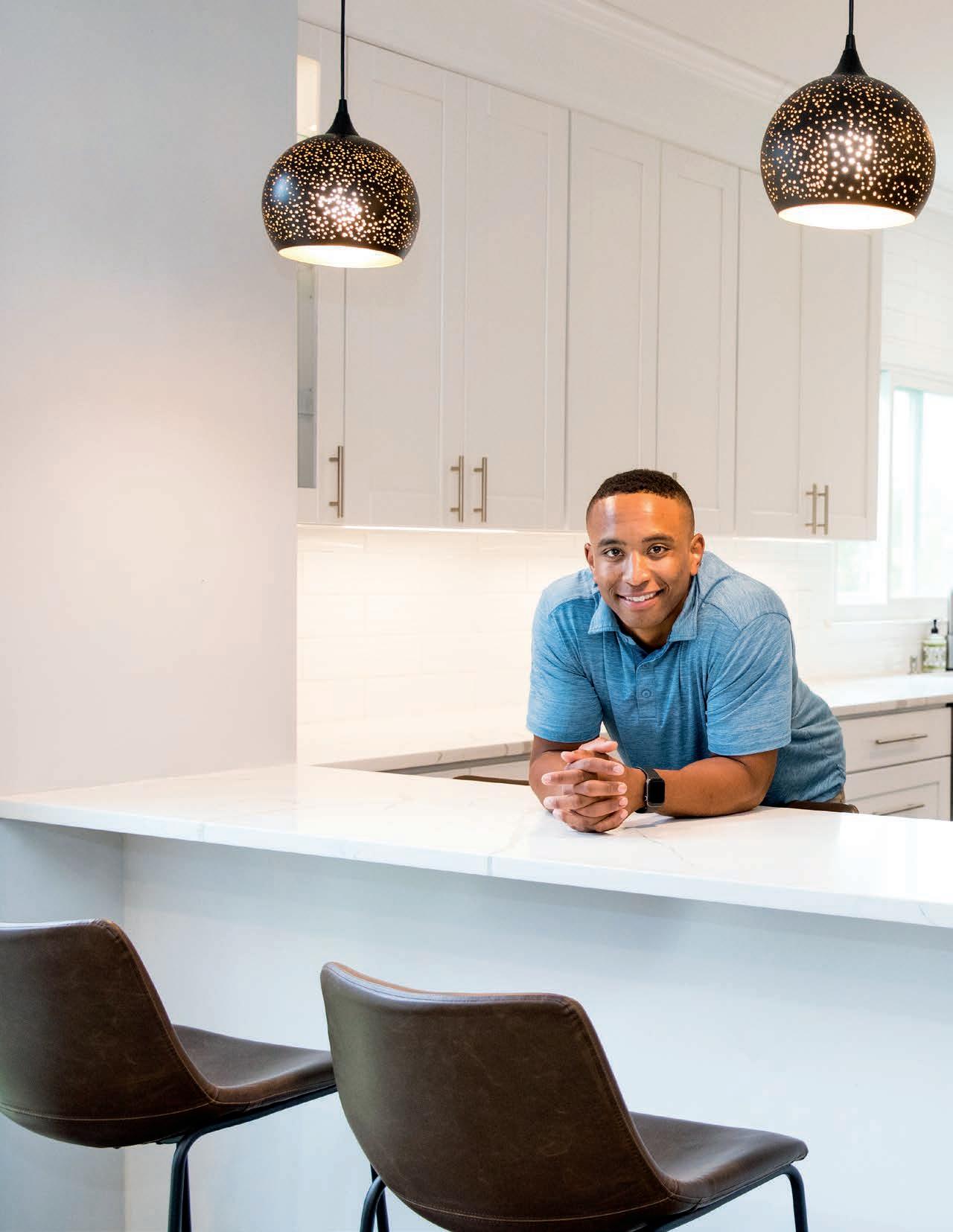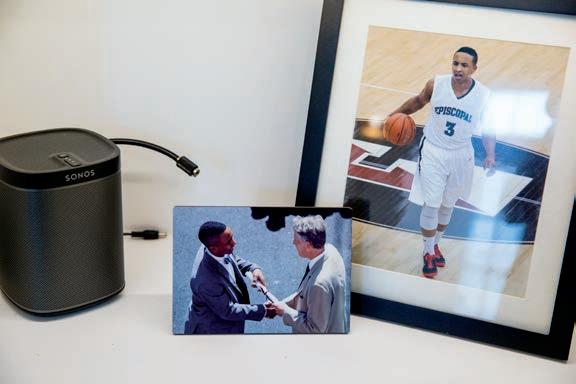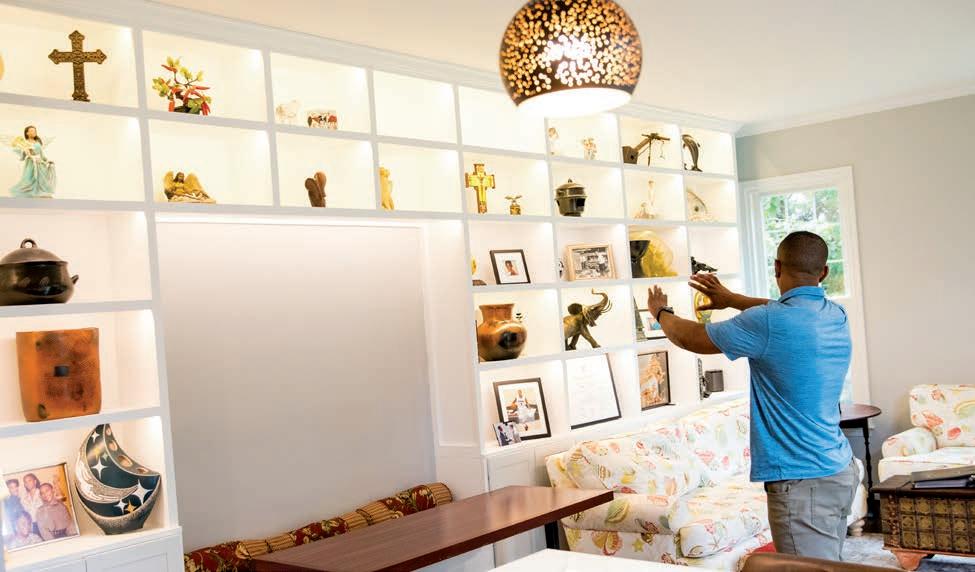
6 minute read
MR. FIXER UPPER
Byron Jones ’14 was on his way to a big-time career in sports management. When he renovated his childhood home as a gift for his parents, he discovered a new passion.
“Mom, can I do your kitchen?” Byron Jones ’14 raised this question to his mother, Hazel Chan, one evening as she was preparing to leave the next morning on a business trip. Byron had just graduated from a master’s program in sports management at Georgetown and, with time on his hands, he had a renovation project in mind. With his uncle, an experienced professional in construction, he had remodeled the family’s basement. Now, he was eyeing a kitchen makeover.

“Can I renovate it?” he persisted.
Byron had returned to his parents and his childhood home a year before, but they were living like the proverbial ships passing in the night. Byron, a graduate assistant with the Georgetown men’s basketball team, frequently jetted off to road games. His mother, meanwhile, worked long days and traveled frequently as a registered nurse for a pharmaceutical company. In this brief moment, busy getting ready for her trip, Hazel said fine.
Although her 24-year-old son had little construction experience, he had done a solid job transforming their basement into a handsome apartment for himself, and he always finished what he started. Plus, Hazel had some money saved, so why not?

A standout basketball player at Episcopal, Byron was beginning a career in sports management before he got the construction bug and started his own company.
Hazel left for her trip at 5 o’clock the next morning, and when she returned home late that night, she gaped at what she saw. Outside her red-brick Colonial were stacked the remains of her cabinets. Inside, her kitchen was gone.
“There were big question marks when we came in and saw the kitchen demolished,” remembers Byron’s dad, Ron, a semi-retired IT consultant. “We were wondering, ‘Where do we go from here? Are we at the right house?’”
“Byron,” Hazel howled, “we talked about this yesterday. I said ‘yes’ yesterday. I had no idea you were serious.”

Byron is always serious. He is also jovial and fun-loving, but when it comes to achieving what he sets out to do, he is focused and fast. He completed his two-year graduate program, for instance, in just 12 months while also working as a graduate assistant for the basketball team.
“My whole life up until that point had been about sports,” says Byron, who played basketball at Episcopal and explored sports medicine as an undergrad at the University of Maryland, where he majored in kinesiology.
When he graduated from Georgetown, he never intended to change course. “I think that I could have gone right into a job,” Byron says, “whether it was in sports, basketball … I had a great opportunity with the Redskins.”
There was just one thing he needed to do first.
When Byron started graduate school, he had only the most basic carpentry and plumbing skills. But he enlisted the help of his uncle in tricking out his parents’ basement so that he could live there and avoid Georgetown’s sky-high rents.
Byron’s uncle had decades of commercial and residential construction experience, specializing in framing, electrical work, and everything in between. “I had so many questions,” Byron says. “I wanted to learn everything. My homework went from, ‘Make sure this place is clean when I get back so I can get right to work,’ to ‘Finish hanging the drywall.’” He picked up every new skill quickly and easily.
“I always tell him, ‘Your ability to do so much is very dangerous.’” Hazel says. “It is wonderful and powerful and dangerous. Very few people become very successful being a Jack-of-all-trades.”
Hazel herself is an I-can-do-anything superwoman entrepreneur. She and Ron built a multimillion-dollar software and database company from the ground up. She also scoured flea markets and trade shows for things to sell at the discount and thrift store she opened and owned. When that business became too all-consuming for a mother of two young children, she went back to school to get her nursing degree; she was then in her 50s. And when an injury slowed her down as a nurse, she matched her nursing salary selling books on Amazon.
“I relate to and love her hustle,” says Byron. “She’s always grinding.”
Until recently, the Jones home reflected Hazel’s grind and her eclecticism. She was a busy working mom most of her kids’ lives, and her home was a repository for all the treasures she had not yet sold. “She looked at all the stuff and saw dollar signs,” Byron says. “She developed an attachment to it.” Freeing her from that attachment, Byron felt, would be a gift worthy of the parents who had given him so much.
Byron says, “I had an opportunity to change my parents’ lives.”
“Every day was a new surprise,” Hazel says.
After recovering from the initial shock of seeing her kitchen disappear, Hazel watched in awe as Byron’s renovation project grew. What was once a kitchen makeover soon extended to the dining room, living room, office, and bathroom. No corner of the main floor went untouched. In the living room, floor-to-ceiling built-in shelves with soft undermount lighting display the family’s most precious memorabilia. In the dining room, white wainscoting and crown molding dress up the stately navy blue walls.
But the kitchen outshines all of this. Awash in bright light and gleaming stainless steel, it looks Food Network-ready, with slick white marble countertops, a touch-activated faucet, and an oversized industrial gas range built into the kitchen island. Pinpricked pendant lights over the bar cast stars in all directions, and Alexa illuminates them on command.
“I just stood here,” Hazel says in a video about the renovation produced by Madison Hughes ’15, “for almost an hour just crying and just excited.”
“I had an opportunity to change my parents’ lives,” Byron says of the renovation.
That was January 2020. Within a few weeks, when the pandemic locked down much of the planet, the home Byron had beautifully renovated would become his family’s world.

“Thank God that renovation was finished,” Byron says. “The space is so much more comfortable.”
Spending more time at home with his family gave Byron a chance to slow down for perhaps the first time in his life, with profound results. Byron now is pursuing a career in construction and real estate. He has become a licensed home-improvement contractor and started his own business, Nuwave Construction. He’s already done work for more than 50 clients. In addition to residential renovations, he is doing commercial build-outs, and he recently secured his first government contract.
“If you had asked me a few years ago,” he says, “I would have said, ‘No chance.’ Sports was my life. I was going to work my way up.”
Today, Byron is more focused on a word that he learned to revere at Episcopal: balance. Balance is about stasis and movement — finding the still point in the center of the tension pulling us in all directions. He wants to help others create spaces where they can feel centered, and, at least for now, he wants to create a life for himself that is more balanced than that of a sports executive, with time for friends and family.
“I believe he will always maintain that balance,” Hazel says. “He has a personality, I think, that makes him put people first.”

The family’s new living room features floor-to-ceiling built-in shelves with soft undermount lighting to display family memorabilia.







